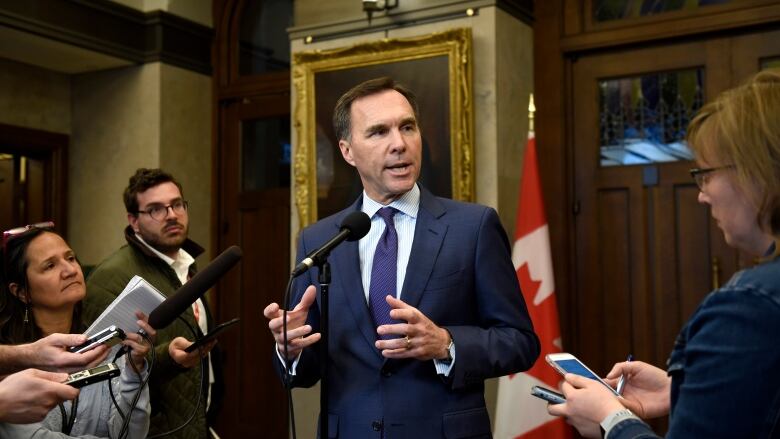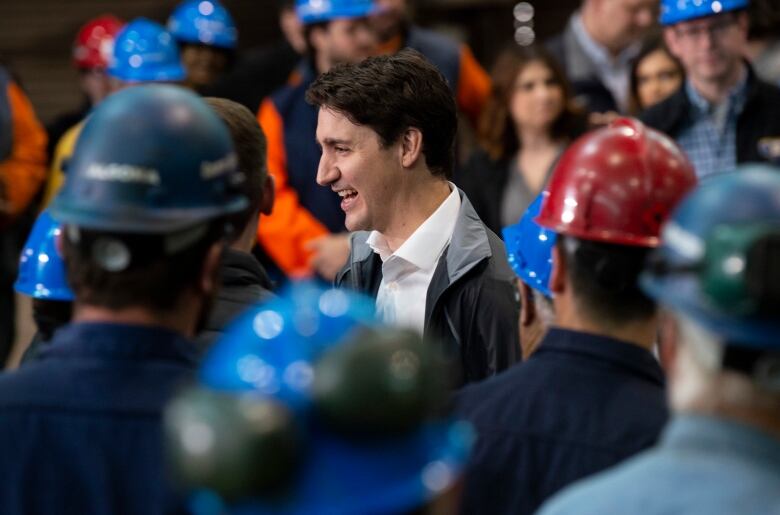Bill Morneau's hasty bill to protect the steel industry carries risks
Opposition poised to support legislation that suspends Canada's WTO commitment

The broad politicalsupport greasing the wheels of C-101, Finance Minister Bill Morneau's new legislation to change Canada's trade safeguard rules, may obscure the calculated riskthe Liberal government is taking withits strategy to protect the steel industry.
Despite the long list of other billsawaiting passagebefore this Parliament dissolves including last week's hotitem,the new NAFTA's implementation billlegislationto amend Canada's Customs Tariff and Canadian International Trade Tribunal (CITT) Acts leapfrogged other priorities for its first day of debate Thursday.
"It gives us the ability, should we need it, to put in place a safeguard with a shorter timeframe than we were previously allowed to do," Morneau said Monday.
We're meant to notice the "should we need it"part of that statement.
This change doesn't necessarily mean the government will haveanother go at imposing surtaxes on offshore steel. But it wants the flexibility to slap safeguardson in a hurry, just in case.
"You don't go out and get yourself a shiny new tool, put it in the toolbox and then admire it," said Jesse Goldman, who representsconstruction companies hurt by the first round of emergency safeguards last fall.
"The temptation to use this, and the pressure that's going to be put on government to use this, is going to be immense," the lawyer said inan interview Wednesday with CBC News Network'sPower & Politics.
The government took its first kick at thiscanback in October, when emergency safeguards were applied to seven steel products provisionallyfor 200 days. The trade tribunal then probed the evidence and found an extension could be justifiedforonly twoof the products.
Steelmakers and steelworkers disagreed withthatconclusion. They called onMorneau to disregard his own tribunal and keep shielding all seven products.
He said no. They weren't impressed. Theykept lobbying.
'Canada's market will collapse'
So long as the Trump administration's "national security" tariff wall remains, critics warn,offshore steel the Americans are no longer buying hasto go somewhere.
"Things are moving [and] changing rapidly every day," Catherine Cobden, the president of the Canadian Steel Producers Association, told Power & PoliticsMonday.
"Many other countries have taken steps to manage their imports," she said, referring to safeguard actions in places likethe European Union. If the government doesn't act, she warned, "Canada's market will collapse."

Current legislation requires the government to wait for two years before re-introducingthe protection the industry says it needs:a 25 per cent surtax on shipments from outside North America, imposed only when volumes surgeabove historical averages.
Identifying truesurgesisboth tricky and controversial, leading to lots of billable hours for trade lawyers.
Conventional trade remedies like anti-dumping and countervailing duties already block other countries from dumpingcheap foreign steel into Canada.
Safeguard measures are different. They're a temporary tool, designed to help an industry adjustto new competition whenfairly-priced imports are threateningto seriously disrupt a market.
That's what the tribunal investigated thoroughly last winter, finding insufficient evidence of surges orharm. Because Morneau wasn't willing to overrule it, he had to find another way to appease the industry.
The only legal way to reimpose safeguards requireda two-year wait. This legislation now rewrites lawsto lift that waiting period for two years, dating fromthe point when this new law comes into force.
Buttherequirement forthis waiting period isn't Canada's to rewrite. It's the World Trade Organization's rule. Canada revised its legislation in 1994to comply withtreaty obligations.
WTO concerns 'under discussion'
Canada has championedthe need for other countries (but especially the United States)torespect the international rules-based trading system. Ottawa has hosted aninitiative to propose WTO reforms.
But in this case, respecting WTO rulesispolitically unpalatable.
Ahead of talks Saturdayin Japan with other G20 trade ministers, CBC News asked International Trade Diversification Minister Jim Carrwhether he'sdiscussed Canada's plans to withdraw from its treaty obligations, at least temporarily, with its trading partners.
"That's all under discussion," he said.
In letters to Opposition Leader Andrew Scheer and NDP Leader Jagmeet Singh asking them to help expedite C-101, Morneaureminded both parties ofstatements they'd made in support of safeguards to protect steelworkers, appearing to suggest that opposingthis bill would makethem hypocrites.
In April, after the CITTdeclined to endorse longer safeguards forall seven steel products, the NDP's Alexandre Boulerice jumped to his feet aftera thinly-attended Friday question period to propose a unanimous, all-partymotion calling for permanent safeguard measures. Ascattering of MPs let it carry on a voice vote.
Today the House of Commons unanimously adopted motion to save #steel jobs & urge the Minister of Finance @Bill_Morneau to implement permanent safeguard measures for our steel industry immediately.#cdnpoli #safeguardCDNjobs pic.twitter.com/Rn3vj3lTLL
—@CSPA_ACPAOn Tuesday, Conservatives voted against Morneau'smotion toset upthis legislation. Butit's not clear there's anyone in the House of Commons who hopesto ultimately defeat it.
"We want to, and may, support this bill," Conservative foreign affairs critic Erin O'Toolesaidas debate kicked off Thursday. He then laidout a litany ofproblems with the government's strategy and accused it ofnot inviting opposition MPs to a promised briefing on the bill.
"This is an example of an abandonment of a rules-based approach to trade, and our trading partners and friends around the world notice that," O'Toole said. "The government cannot rush in all of these bills at the end of Parliament because it messed up its trade strategy for four years."
Following Trump's orders?
Sault Ste. Marie, Ont.'s Liberal MP, Terry Sheehan who also chairs Parliament's all-partysteel caucus recentlyfired a letter off to his local paper, saying that the steel workers he represents (and, presumably, still wants to represent after October's election) "shouldn't have to wait months and months to feel protected."
NDP trade critic Tracey Ramsey told CBC News"it's ridiculous that we have reached this point," because Morneau should have acted earlier to disregard the tribunal and continue the surtaxes.
"Everyone on the Hill was working hard to get him to change his mind, but they were too fearful of a WTO challenge," she said. "It's not as though we would be out of line with our partners,that also want us to act."
Cobden, representing Canada's steel mills, suggested during her CBC interview that one trading partner in particular is demanding this measure.
"Part of our common understanding with the U.S. is that we all need to take measures to prevent that surge of imports which distort our fairly-traded domestic markets," she said, citing the agreement that saw theU.S. lift its steel and aluminum tariffs on Canada and Mexico whilereserving itsright to snap them back if it feels threatened in the future.
Morneauhad batted away that suggestion Monday.
"This isn't in any way a part of any deal," Morneau told reporters.
Retaliation may follow
Other countries continue to challengethe Trump administration'stariff protections for steel. It will betough for Canada to defend itself internationally if this bill isseen as being directed by Washington.
"The rule of law is not a game of ignore the rules and follow the leader," said lawyer Jim McIlroy, who represented clients opposed to the safeguards atthe tribunal hearings.
"We'll engage in the law of the jungle and we'll hope that we're fleet of foot and people won't catch us. The fact that the Trudeau government is only doing this for two years illustrates that they know they will eventually get caught."
"As a middle power, this will not end well for Canada," McIlroyadded.
Hebelieves countrieswon't wait to retaliate, potentiallyagainst Canadian agriculture exports.
"It's already attracted significant attention from other WTO members. Three of them, in fact, contacted me this morning," Goldman said, declining to reveal their identities for now but suggesting it won't be long until their concerns are made public.
The"unprecedented" repeal of Canada's obligations, even temporarily, is "clearly offside the WTO," he said.
Goldman suggestedCanada may be hoping that by the time any formal complaint is made, the two years will have elapsed and Canada will have reinstated its required waiting period and returnedto compliance.
(The ability of WTO members to arbitrate such a dispute is also in jeopardy, unless the U.S. stops blocking new appointments to its appellate body.)
"It may be good short-term political policy. We all know that there's an election coming up in a few months and that smokestacks and hard hats tend to make good photo opportunities," Goldmansaid. "But these types of trade rule-breaking policies are bad for the Canadian economy.
"Canada's moral high ground after this will be in tatters."















_(720p).jpg)


 OFFICIAL HD MUSIC VIDEO.jpg)
.jpg)



























































































